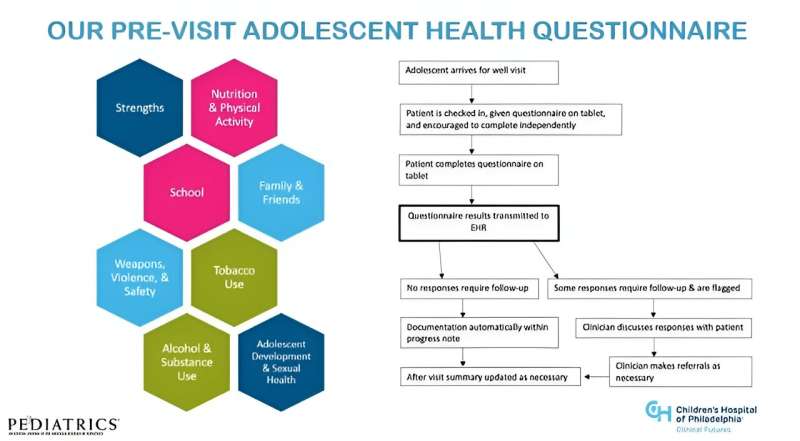This article has been reviewed according to Science X's editorial process and policies. Editors have highlighted the following attributes while ensuring the content's credibility:
fact-checked
peer-reviewed publication
trusted source
proofread
New adolescent health questionnaire helps doctors and families navigate complex issues

While doctors understand that adolescents have certain unique health questions and concerns, several challenges prevent this critical information from being collected in a systematic way and providing appropriate referrals across a wide group of patients.
Now, newly published research from Children's Hospital of Philadelphia (CHOP) describes a useful and effective adolescent health questionnaire that has been successfully adapted across CHOP's Primary Care Network which allows clinical staff to have better discussions with appropriately aged patients and develop better intervention strategies when needed.
The findings were recently published in the journal Pediatrics.
Nutrition, physical activity, relationships, school, tobacco, alcohol and drug use, mental health, sexual behavior, gender identity, safety, and strengths are all important topics to discuss with adolescents during preventive care visits with their pediatricians. However, discussions about these topics remain consistently low due to a variety of factors, such as confidentiality concerns, lack of time during appointments, and a discomfort among patients and parents to address some of these topics.
Discussions about sensitive health issues can be difficult to engage in face-to-face with a doctor, which can often lead to discrepancies in data. For example, only 1–2% of adolescents report tobacco use to doctors, yet the U.S. Centers for Disease Control report e-cigarette use at about 8% of youths, suggesting doctors are not getting the full account of information during routine doctor's appointments.
"There was a substantial amount of evidence suggesting that pediatricians were missing several key points of discussion during adolescent health appointments," said lead author Brian Jenssen, MD, a researcher and primary care pediatrician with the Division of General Pediatrics at CHOP.
"We wanted to create a method that allowed teens to have these important discussions with their pediatricians and helped guide a comfortable conversation to address issues that matter and provide adolescents with the resources that would benefit them the most."
An innovation team called The Possibilities Project (TPP), which consists of pediatricians, researchers at Clinical Futures, and technology experts at CHOP developed and piloted an adolescent health questionnaire. The questionnaire included available evidence-based screening tools and was aligned with screening recommendations of the U.S. Preventive Services Task Force and the American Academy of Pediatrics.
This pre-visit questionnaire helps promote discussion about certain adolescent-focused topics, identifies which adolescents may benefit from further intervention, and expedites the visit to focus on key topics. The results of the questionnaire are then integrated with electronic health records to improve workflows and boost efficiency.
During the study period between October 2020 and December 2021, a total of 22,147 questionnaires were completed by 20,749 adolescents between the ages of 13 to 21 at their preventive visits in 31 clinic sites across CHOP's Primary Care Network. The researchers found that the adolescent health questionnaire increased collection of information across important topics, especially for gun safety, substance abuse, sexual activity, sexual orientation and gender identity.
Prior to the study, between 0% and 25% of visit records captured this information. This increased to between 92% and 95% in these domains. All 31 primary care practices involved in the study had a completion rate of 88.7% during the study period.
Since the study period began, more than 70,000 questionnaires have been administered at adolescent preventive visits throughout CHOP's Primary Care Network and the completion rate has increased to more than 91%.
"The feedback we've received from families has been tremendous, as both teens and parents like this approach and feel more comfortable disclosing this important information," Jenssen said. "We have tailored interventions related to all of these topics, and this amount of data allows us to identify areas where we may need to delve a little deeper if some of these topics impact more teens than we historically thought."
"Given that many adolescent patients are seen in the pediatric primary care setting, our Care Network was able to easily and successfully integrate this questionnaire into routine preventive health care visits," said study co-author Lisa Biggs, MD, Vice President and Associate Chief Medical Officer of the CHOP Care Network. "Since being piloted a few years ago, the questionnaire is now a routine part of practice with a very high completion rate, which empowers better appointments between adolescents and their caregivers."
"For years, those of us working in adolescent medicine understand the challenges of building trust with adolescent patients in order to help these adolescent patients prepare for healthy adulthood," said study co-author Carol A. Ford, MD, an attending physician with the Craig-Dalsimer Division of Adolescent Medicine at Children's Hospital of Philadelphia.
"This questionnaire is another incredibly valuable resource for these patients to help foster communication with their pediatricians, and our data already shows improved communication regarding a variety of important topics."
More information: Brian P. Jenssen et al, Accelerating Innovation in Primary Care to Support Adolescent Health Discussions, Pediatrics (2024). DOI: 10.1542/peds.2023-064285



















